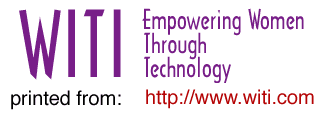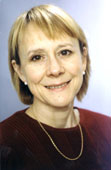
 Esther Dyson
Esther Dyson
Chairman
EDventure Holdings, Inc.
Esther Dyson has devoted her life to discovering the inevitable and
promoting the possible. As an investor/commentator, she focuses on
emerging
technologies (groupware, artificial intelligence, the Internet, wireless
applications), emerging
markets (Eastern Europe) and emerging companies (ComputerLand Poland;
Medscape; Uproar.com; Orchestream; TrustWorks; Brunswick Direct;
NewspaperDirect; IBS of Russia; NetBeans of Prague, just sold to Sun
Microsystems;
and others you will someday hear of). In 1994, she was one of the first
to
explore the impact of the Net on intellectual property (among other
things,
why Bill Gates now plans to offer software as an online service). In
1997,
she published a book on the impact of the Net on individuals' lives,
"Release 2.0: A design for living in the digital age."
In addition, she donates time and money as a trustee to emerging
organizations (the Santa Fe Institute, the EastWest Institute, the
Eurasia
Foundation and the Electronic Frontier Foundation). And finally, as
chairman, she leads ICANN, the Internet Corporation for Assigned Names
and
Numbers, a new international agency charged with setting policy for the
Internet's core infrastructure (technical standards and the Domain Name
System) independent of government control.
After graduating from Harvard in economics, Dyson began her serious
career
in 1974 as a fact-checker for Forbes and quickly rose to reporter. In
1977
she joined New Court Securities as "the research department," following
Federal Express and other start-ups. After a stint at Oppenheimer
covering
software companies, she moved to Rosen Research and in 1983 bought the
company from her employer Ben Rosen, chairman of Compaq. Renamed
EDventure
Holdings, the company publishes the monthly computer-industry newsletter
Release 1.0 and holds two annual conferences, PC Forum in the US and the
High-Tech Forum in Europe. With eight people, EDventure has been the
vehicle for Dyson's adventures ever since. (Asked about her greatest
achievement, she says: "I hope I haven't done it yet!")
The daughter of an English physicist and a Swiss mathematician, Dyson
started traveling in Eastern Europe in 1989 and eventually helped to
fill the small
but vital vacuum at the intersection of Eastern Europe, high-tech and
venture capital. Her portfolio now includes four IT companies in
Russia and
eight start-ups from Poland, Hungary and the Czech Republic, as well as
many
others in northern Europe and the United States. Also, she sits on the
advisory board of Internet Capital Group, advising a collection of
leading business-to-business start-ups. She sums up: "Basically, at 48,
I'm retired. All I do is what I want to do."
1. What was your first job in technology?
2. Who has been your most significant mentor? Why?
3. What has been your greatest challenge and what strategies did you use to overcome obstacles?
4. Who has been the most influential person in your life? Why?
5. What lessons have you learned that would be valuable to women beginning their careers in technology?
6. What new technology do you believe will have the most positive impact on the world in the next 20 years? The most negative impact?
On a lighter note:
2. What was the last book you read? What books do you love to recommend?
3. If you were to choose a different profession, what would it be?
4. What is your definition of success?
Never really had a job *in* technology... just writing about it.
Started doing that at Forbes, where I wrote about Data General and other
computer & software companies (1974-77), and specialized in high-tech when I became a securities analyst (1977-82).
Too many people to list, or none.
I've been incredibly lucky and haven't faced many real challenges, other
than managing my own time.
Again, no single person. Started with my parents, of course.
Live your own life, don't expect
anyone - mentor, WITI, whatever - to define your goals or strategies or
tactics for you.
The Internet.
1. If you could have dinner with any 2 people (living or not), who would they be?
Queen Elizabeth I - she has always
fascinated me. George Orwell.
"Personal History," by Kay Graham
Foreign correspondent
Defining success for yourself, stretching and achieving it.
|
For more 'WITI Women' articles, go to: http://www.witi.com/wire/witiwomen/ For all the latest news and information on women in technology, visit http://www.witi.com |